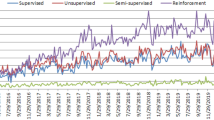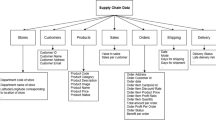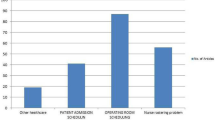Abstract
The need to develop schedules for projects with resource constraints and cash flows arises in organizational settings ranging from construction planning to research and development. Given the intractable nature of the problem, a variety of knowledge sources relevant to the project scheduling task have been identified in the Operations Management literature. These include a large number of heuristic procedures that can be used to generate feasible project schedules as well as recent neural network-based approaches that can select appropriate heuristic procedures to apply to a specific instance of the project scheduling problem. While integrated application of these knowledge sources is required to effectively support scheduling, previous work has focussed on developing and implementing them in isolation. The problem space computational model presented in this paper addresses this shortcoming by integrating these various knowledge sources, thus enabling the development of decision support systems for resource constrained project scheduling. More generally, the modeling approach used in this paper can be applied to create systems to assist knowledge intensive tasks that arise in many organizational settings.
Similar content being viewed by others
References
Ali, I., R. Padman, and H. Thiagarajan, “Dual algorithms for pure network problems”, Operations Research, 37 (1), 159–171 (1989).
Baroum, S. M. and J. H. Patterson, “The development of cash flow weight procedures for maximizing the net present value of a project,” Journal of Operations Management, 14 (3), 209–227 (1996).
Bey, R., R. H. Doersch, and J. H. Patterson, “The net present value criterion: Its impact on project scheduling,” Project Management Quarterly, 12, No. 2, 35–45 (1981).
Chiu, Huan Neng., Deng Maw Tsai, “An efficient search procedure for the resource-constrained multi-project scheduling problem with discounted cash flows.” Construction Management and Economics, London, 20 (1); 55 (2003).
Davenport, T., and Laurence Prusak, Working Knowledge: How Organizations Manage What They Know, Harvard Business School Press, 1998.
Davis, E. W., and J. H. Patterson, “A comparison of heuristic and optimal solutions in resource-constrained project scheduling,” Management Science, 21 (8), 944–955 (1975).
Earl, M. J., and Ian A. Scott, “What is a Chief Knowledge Officer,” Sloan Management Review, 40 (2), 29–38, (1999).
Grinold, R. C., “The payment scheduling problem,” Naval Research Logistics Quarterly, Vol. 19 (1), 123–136 (1972).
Kelley, J. E., “Critical path planning and scheduling: MATHEMATICAL BASIS,” Operations Research, Vol. 9, 296–320 (1961).
Kimms, A., “Maximizing the net present value of a project under resource constraints using a Lagrangian relaxation based heuristic with tight upper bounds.” Annals of Operations Research. Basel: Feb 2001. 102 (1), p. 221 (2001).
Krishnan, R., X. Li and D. Steier, “A knowledge-based mathematical model formulation system,” Communications of the ACM 35 (9), 138–46 (1992).
Kurtulus, I. S., and E. W. Davis, “Multi-project scheduling: Categorization of heuristic rules performance,” Management Science, 28, (2), 161–172 (1982).
Kim, W. Chan, and R. Mauborgne, “Fair process: Managing in the knowledge economy”. Harvard Business Review, 75 (4): 65–75. (Jul-Aug, 1997).
Kolisch, R., and R. Padman. “An integrated perspective of deterministic project scheduling,” em Omega, 29 (3), 249–272 (2001).
Laird, J., A. Newell, and P. Rosenbloom, “Soar: An architecture for general intelligence,” Artificial Intelligence, 33, 1–64 (1987).
Morton, T. E, and D. W. Pentico, Heuristic Scheduling Systems: With application to production systems and project management, John Wiley and Sons: New York, 1993.
Newell, A., Unified Theories of Cognition, Harvard University Press, Cambridge, MA, 1990.
Newell, A., G. Yost, J.E. Laird, P.S. Rosenbloom and E. Altmann, “Formulating the problem space computational model, CMU Computer Science: a 25th Anniversary Commemorative,” edited by Richard F. Rashid, ACM Press: New York, (1991).
O'Leary, D. E., “Using AI in knowledge management: Knowledge Bases and Ontologies,” IEEE Intelligent Systems, May June (1998).
Padman R., D. E. Smith-Daniels, and V.L. Smith-Daniels, “Heuristic Scheduling of Resource-Constrained Projects with Cash Flows,” Naval Research Logistics, 44, 364–381 (1997).
Padman, R, and S. Roehrig, “A genetic programming approach for heuristic selection in constrained project scheduling,” Interfaces in Computer Science and Operations Research: Advances in Metaheuristics, Optimization, and Stochastic Modeling Technologies, edited by R.S. Barr, R.V. Helgason, and J.L. Kennington, Kluwer Academic Publishers, Norwell, MA 405–421 (1997).
Patterson, J. H., “Project scheduling: The Effects of Problem Structure On Heuristic Performance,” Naval Research Logistics Quarterly, 23 (1), 95–122 (1976).
Russell, A. H., “Cash flows in networks,” Management Science, 16 (5), 357–373 (1970).
Russell, R. A., “A comparison of heuristics for scheduling projects with cash flows and resource restrictions,” Management Science, 32 (10), 1291–1300 (1986).
Vanhoucke, Mario., Erik Demeulemeester, Willy Herroelen, “On maximizing the net present value of a project under renewable resource constraints,” Management Science. Linthicum: 47 (8), p. 1113, (2001).
Ulusoy, G., F. Sivrikaya-Serifoglu, and S. Sahin. “Four different payment programs for the multi-mode resource constrained project scheduling problem with discounted cash flows,” Annals of Operations Research, 102, 237– 261 (2001).
Yang, Y, and D. Zhu, “Randomized allocation with nonparametric estimation for a multi-armed bandit problem with covariates,” Annals of Statistics, 30, 100–121 (2002).
Zhu, D., R. Padman, “Connectionist approaches for solver selection in constrained project scheduling,”Annals of Operations Research, 72, 265–298 (1997).
Zhu, D., R. Padman, “A metaheuristic scheduling procedure for resource-constrained projects with cash flows.” Naval Research Logistics, 46, 1–18 (1999).
Zhu, D., M. Prietula, and W. Hsu, “When processes learn: Steps Toward Crafting An Intelligent Organization,” Information Systems Research, 8 (3), 302–317 (1997).
Author information
Authors and Affiliations
Corresponding author
Rights and permissions
About this article
Cite this article
Padman, R., Zhu, D. Knowledge integration using problem spaces: A study in resource-constrained project scheduling. J Sched 9, 133–152 (2006). https://doi.org/10.1007/s10951-006-6776-x
Issue Date:
DOI: https://doi.org/10.1007/s10951-006-6776-x




